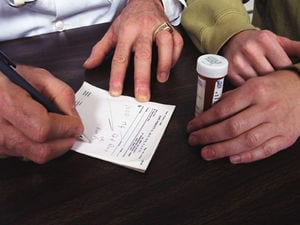
MONDAY, Feb. 12, 2018 (HealthDay News) — Some patients are more likely than others to get antibiotics they don’t need, new research shows.
White adults and children, along with those who had private insurance and lived in urban areas, were more likely to receive a prescription for an antibiotic for common conditions caused by viruses, the researchers said.
Antibiotics only work against bacterial infections, not viruses.
“Understanding the factors that impact prescribing is critical to determining how to reduce the misuse of antibiotics,” said researcher Melanie Spencer. She’s executive director of Carolinas HealthCare System’s Center for Outcomes Research and Evaluation, based in Charlotte, N.C.
“Our findings demonstrate that variation in prescribing patterns exists and is associated with several patient, practice and provider characteristics,” she said.
In the study, the researchers reviewed data from more than 281,000 adults and children in North Carolina who were seen for four common conditions that do not routinely require antibiotics: viral upper respiratory infection, bronchitis, sinusitis and uninfected fluid in the middle ear.
Of the four conditions, acute bronchitis resulted in the highest number of antibiotic prescriptions.
Who was doing the prescribing also influenced whether antibiotics were given.
Nurse practitioners and physician assistants were 15 percent more likely than a doctor to prescribe an antibiotic to adults with these four conditions, the study found.
Older health care providers were also more likely to prescribe antibiotics. Family medicine practices had the highest rate of antibiotic prescribing, while pediatric practices had the lowest rate.
The findings were published recently in the journal Infection Control & Hospital Epidemiology.
“By undertaking this research, we can help ensure that our local patients receive the most appropriate, safe care, and are not inappropriately prescribed antibiotics,” study author Dr. Lisa Davidson said in a journal news release. She is medical director for the Antimicrobial Support Network at Carolinas HealthCare System.
More information
The U.S. Centers for Disease Control and Prevention has more on antibiotics.
